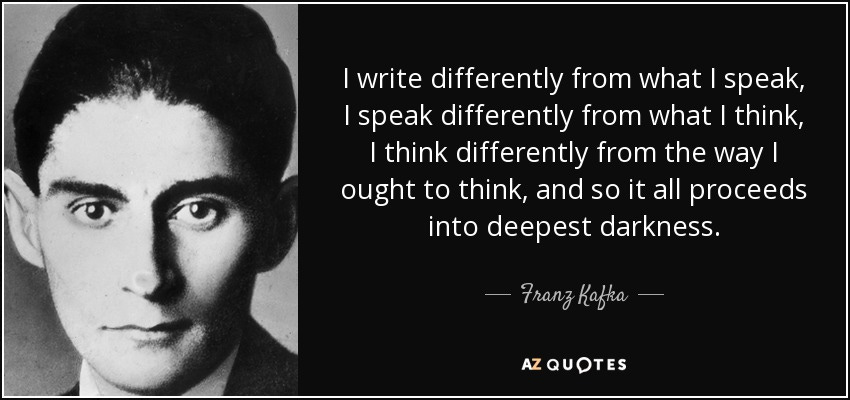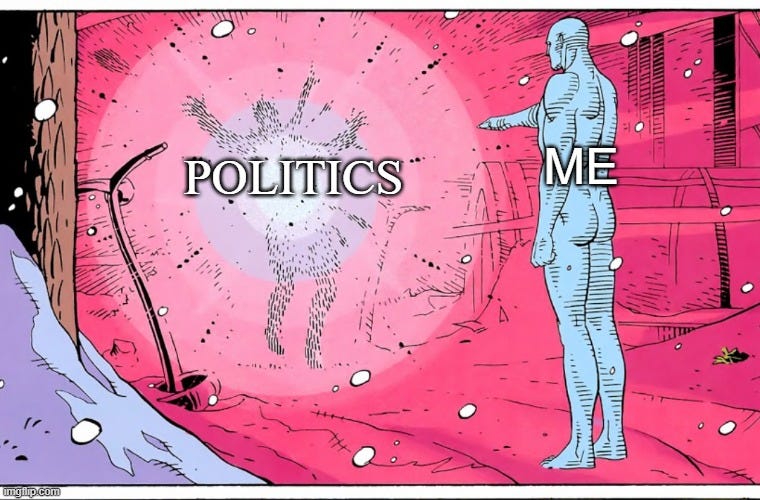Why I Hate Writing
To Teach An I-Language
I hate writing, and other people tell me that I’m good at writing. I don’t think these two facts are contradictory, I think these two facts are two sides of the same coin. I think I am utterly uninterested in keeping an interest in writing anything because I am way more advanced in terms of my language use than anything that would be identifiable as writing to most people. I think we are taught in our educations to think writing is only one specific kind of thing but that is fundamentally an incorrect idea. This isn’t even some kind of poststructuralist deconstruction of the idea of writing. In fact I think poststructuralists were probably sort of trying to react against the new idea that was trying to be born, as ironic as that sounds for how people always think of them as being these über-progressive Bolshevik Marxists who want to tear down everything. Maybe they want to tear down everything, but in my personal opinion that would include the new as well as the old in their case. According to Wikipedia, there’s basically no difference between structuralism and poststructuralism anyway:
A post-structuralist approach argues that to understand an object (a text, for example), one must study both the object itself and the systems of knowledge that produced the object.[11] The uncertain boundaries between structuralism and post-structuralism become further blurred by the fact that scholars rarely label themselves as post-structuralists. Some scholars associated with structuralism, such as Roland Barthes and Michel Foucault, also became noteworthy in post-structuralism.[12]
Also Foucault was a pedo and an AIDS spreader, so I don’t know why anyone takes him seriously at this point. It’s too easy to slip into making various not very polite puns with his name. If anything though poststructuralism just seems like an attempt to take the old philosophy and say it’s new because what’s really new is just too threatening.
Of course what’s really new is threatening. What’s really new is a whole new way of thinking. When it’s fairly common for philosophers who clearly eschew the Linnean taxonomy to define humanity in terms of how it speaks or how it thinks, a new way of thinking and a new way of communicating challenges that definition in a way that Socrates, foreshadowing the absurdity of the Linnean taxonomy thousands of years ago, did not by plucking the feathers from a chicken and saying “Behold! A featherless biped!” The human mind may or may not be at the center of what it means to be human, but in the case it is, changing that constitutes essentially replacing humanity with something else, and in the case it isn’t, well, different types of cognition are too difficult to understand anyway, after all, with thought itself, thinking is the same as doing, imagining is then the same as reality with regard to thought. All the race politics and so-called “woke” garbage I’m sure is also an attempt to cover up the idea of cognitive differences anyway. Clearly cognitive differences have nothing to do with skin color seeing as race is one of those things that’s actually a social construct, so if we call everyone a bigot or oppressed all the time we don’t have to think about their minds. Go poststructuralists who are actually just structuralists without clothes this time. Structuralism is when the Emperor wears clothes and poststructuralism is when the Emperor doesn’t wear clothes, probably because he’s out spreading HIV with Foucault to prove that HIV is a social construct meant to target gay men and to suggest otherwise is HERESY! This means it’s the God-Emperor with no clothes insisting that clothes are a social construct and air can be clothing too if he says it is, after all there’s no air in space, the idea that clothing isn’t air is clearly socially constructed.
![Listen to pZi - The God Emperor [electronica/soundtrack/dune] by .Pal Zoltan Illes (pZi). in Beats of Dune [Vol.I] playlist online for free on SoundCloud Listen to pZi - The God Emperor [electronica/soundtrack/dune] by .Pal Zoltan Illes (pZi). in Beats of Dune [Vol.I] playlist online for free on SoundCloud](https://substackcdn.com/image/fetch/$s_!JEhj!,w_1456,c_limit,f_auto,q_auto:good,fl_progressive:steep/https%3A%2F%2Fsubstack-post-media.s3.amazonaws.com%2Fpublic%2Fimages%2Fd6b54ba2-f1a8-4235-8da8-921afa9f4477_500x500.jpeg)
I mention off and on the whole idea that people like Elon Musk and Bill Gates just seem to think the solution to everything is a gadget. Like oh, we’re the Moon in The Moon is a Harsh Mistress and Earth depends on us for their food supply. We don’t like how Earth is behaving. Are we going to starve them? No, we’re going to build a big catapult and throw a rock at them! I don’t even hate technology or anything, growing crops on the Moon certainly demands a lot of technology, and that makes the catapult seem even sillier. Elon Musk mentioned he wanted an AI so he could listen to music in his head. Like that doesn’t already happen or something. It even happens involuntarily in the case of “getting an earworm.” Maybe he wants to listen to music in his head that he hasn’t heard first. He could learn to read sheet music, or make up a song.
Now I think using technology to put music in your head could be done in a cool way that doesn’t involve brain implants. There’s the binaural beats illusion and radio-frequency hearing, the latter of which is often given as an explanation for many instances of “the hum.” Maybe we can just beam some music into our heads without sticking a chip in there. This is the guy who wants “conceptual telepathy” (not actually “consensual telepathy,” you think Elon Musk really cares about that? He wants to be God-Emperor of Mars, geez, then he will probably run around with no clothes as opposed to at least wearing what John Carter wears because apparently emperors actively seek to be naked, unlike Dr. Manhattan who just doesn’t want to buy pants,) I’m not sure how surgery to physically put stuff in your head and having another being like an AI do all your thinking for you is very conducive to anything I’d consider to be telepathy, it basically just seems like the illusion of it. I mean, do computers do telepathy? I think they decidedly don’t, I think what they do is generally more like optics in frequencies humans don’t generally have access to (except, basically, radio-frequency hearing, which is considered such an anomaly that some people think it’s just crazy talk when it happens despite it being known to science.) So again we have the Brittle Boys Ossification Club giving Rick and Morty a rigor mortis run for their money and trying to “solve” problems in the most stupid way possible.
This brings me to the next point, that I keep having these desires to try to make AIs to do various things I think are interesting like make animations for me. Even with the picture AIs, nothing out there is really satisfactory to me, though I tend to like Stable Diffusion’s interpretations the best out of all the big ones and the fact it’s one of the free ones just helps. We do need technology, because the alternative is basically being really poor, really stupid, or both, since technology is basically just what develops once you know stuff and you make stuff with that. But now I’m starting to think developing new ways of cognition is important for AI to really take off. I mean I’m sure I can make a really cool AI at home without anyone’s approval on a PC, people have done it before, but I don’t think that’ll really take off without there being a context in which it’s needed or wanted. Since at this point I’m basically just learning a bunch of programming and math (when I already know a bunch of programming and math to begin with) and I already have a lot of theoretical ideas I should probably work on developing those ideas in an independent context. There are already lots of other ways they can be implemented that can probably help solve my problem of “hating writing.”
So back to how I think the kind of writing we do is very conditioned. Derrida has the phrase associated with him that “there is nothing outside the text” and that’s sort of something from poststructuralism that I think is not really accurate but is revealing of people’s baseline assumptions. When people write we have words on a page and the words are written in a way that’s assumed to be based on sounds, and I think that’s also the folly of Noam Chomsky. Text also kind of presupposes sounds in a way since text is usually considered to be based on letters which are supposed to correlate to speech sounds no matter how bad people say the orthographies of English, French, or probably worst of all Tibetan are (Tibetan is not widely-studied in the West but I thought it deserved a shout-out since it’s basically the equivalent of “writing English as proto-Germanic.” European languages aren’t always as unique as people think they are, even though they sometimes are, it’s just not 100% of the time like people in their high school language classes think.) However, text also at least puts the primacy on writing over speaking despite this huge push in linguistics to say that language is speaking and not writing. Even if it’s seemingly just because text is permanent and Derrida etc. are basically structuralists and want to say text is like the context of social structures and institutions that things happen in and those things are words, but words are also text, unlike speech which is impermanent, and the idea that text is “not as real” because you have to be formally taught to be literate in the right way actually helps their metaphor about institutions.
So, why do we think writing is about text? Why should words on a page be focused around trying to represent speech sounds in any way? It might make communication easier, but maybe speech sounds should adapt to the possibilities of what can be written instead. This is where my thinking of the whole idea of what other things we can do besides make AIs comes from. We’ve had pictures literally forever. In fact I think pictures predated letters as a way of writing speech sounds anyway. For example in the Phoenician alphabet which gives us both most European alphabets and most Semitic alphabets as well as some others worldwide, the letter A aleph was based on a picture of an ox because the word aleph meant ox and started with the a sound. So the Phoenicians just used pictograms for words which started with certain sounds and eventually those few pictograms got simplified into letters.
That can be useful from a certain frame of reference, but it also seems extremely primitive from another. Chinese and the languages that are based on it already literally have ideograms, though I heard that a lot more Chinese people are basically illiterate because of that and that’s a lot of why WeChat is so popular since it lets people speak instead of writing, however literate Chinese people seem to be way more scholarly. It seems like more work for more reward. People learn to talk more easily than they learn to write and trying to make writing essentially a code for speech seems to be the general trend. I just question that it should be, or that it even is when you write at a high level like this. Most people don’t write like they’re writing a novel or a research paper, most people write in texting language the bare minimum to get a point across and have difficulty with anything longer at all. There are sentences that are supposed to be grammatically identical which are ambiguous in writing but not in speech and vice versa, how can those really be said to be the same language? The whole way of writing essays that you’re academically taught in English just seems like a completely artificial formality, some Old World relic that should be left behind, but probably more a relic of Babylon than even one of England. Why shouldn’t you write your ideas as a comic book or as a musical score or any other way that might be intelligible with how far-removed English writing is from English speaking? Even this kind of writing on Substack that I am forcing myself to do now is basically just some kind of formality that seems completely outdated. Like why do people like Goethe’s Zur Farbenlehre so much? Goethe’s books on science are very serious and Einstein had his books on optics on his bookshelf. That’s a pictorial language that’s not hieroglyphics or anything relating to sound if there ever were one. You don’t even need to speak German for much of the book, you can figure out exactly what the phenomena are from just the pictures.
That is a linguistic construct too. If it were just a drawing of light it would look like a drawing of the way it looks. It’s recognizable what it is, but nothing really looks like that around us. It’s all sort of “symbolism,” but I would still differentiate that from semiotics which is where I think people get confused and this is where people get confused with the whole Chomskyan idea of e-language and i-language which I think is the most important thing he came up with besides universal grammar, even though I think Chomsky is also kind of going off the deep end by not understanding the full implications of that idea. It’s not just a sign, meant to signal or communicate things, which is what I see semiotics as essentially being, which would fall under basically pragmatics in linguistics and also require specific instances of language to be used for communication.
You see, in Chomskyan linguistics, language is not for communication at all and Chomsky believes that first there were mental languages which are i-languages. Just today I read someone erroneously describe it as structuralism and i-languages as being about the structure and e-language as being an instance of language but that’s not true, Chomsky was originally anti-structuralist and is still generally considered that way (and probably has a way better claim to being “poststructuralist” than Foucault in that way.) I myself sent an e-mail to him ages ago saying that e-languages and i-languages were like noumena and phenomena and he was like no, that’s not what it is. I-languages are just languages for thinking that he sees as having developed before languages for speaking. What I see as sort of the futility of his program is the fact he still seems to equate i-languages with spoken languages like English, French, Hebrew, etc. even if he thinks of the categories as basically being useless and political, and he doesn’t think mathematics has anything to do with linguistics when realistically that’s basically all that’s left. Why would only spoken languages be i-languages though? Why would a language someone thinks in need to be spoken at all? I think the idea of language really does apply to pictures, music, and other things, not as a metaphor but actually, provided that there’s syntax, semantics, and the other elements of language involved, even if it’s nothing like a spoken (or written, or signed) language.
Why did language evolve? – Philosophy of Linguistics (wordpress.com)
Some more examples: comics and memes.
For example, here is Dr. Manhattan who doesn’t care about pants blowing up Rorschach and there are some meme words written on it by me. I used this to explain how little I care about politics. “Well of course it means that, he’s blowing Rorschach up and it takes him basically no effort to do that!” Yeah, but how is that idea conveyed? The image is a certain moment in time, it’s in a style that’s not remotely realistic and frankly probably closer to hieroglyphics than realism if we absolutely had to put it on a binary scale, there are like six colors and a bunch of lines, it’s light on a screen that’s been copied from ink on a page, and then there is text written on it. The text is also in two different fonts in the meme as the default. It might not be a bunch of words appearing in some kind of sequential order on a page, but you could absolutely do a syntax tree of it regardless.
I think a lot of the reason there are so many Marvel movies and other superhero movies despite a lot of people being burnt out of them is because there’s so much visual language in comics that’s easy to translate to film. The comic itself can almost be used as a screenplay. Not all comics are superheroes of course but that still makes it easier, especially when those are the IPs people have. I don’t think it even should be thought of as superhero movies so much as comic book movies because of that. I think that’s also why on the flipside we don’t have a Magic: the Gathering movie or show, or even a video game that isn’t just the cards, and it all just keeps getting canceled over and over. That’s also a visual language but it’s also almost impossible to translate to film or animation despite there being some Magic: the Gathering comics. I think that’s one thing I would really like to try to use AI to do personally. I can visualize what it would look like and I think everyone can visualize what it would look like and I think that’s the problem, it can be easily visualized but is almost impossible to make so people are just discontent with whatever comes out. Sure, there are the promo videos but they don’t seem to capture the aesthetic or ideas of the world on the cards very closely.
Or take for example Liszt’s Faust Symphony, which I picked because it’s an example of the use of Leitmotive that isn’t Wagner. Liszt and Wagner knew each other personally, and Liszt actually chewed out Wagner for writing Antisemitic garbage personally (so Wagner wasn’t as bad as the Nazis in my opinion even if that was really cringe and I think he shouldn’t have done it just like Liszt thought he shouldn’t have, he was kind of a huge jerk but not into pogroms, much less gas chambers and he actually did hire some Jewish people to run things at his opera house off and on, not really interested in cancelling someone for being kind of a huge jerk even if you shouldn’t be a huge jerk, but then, the real issue is just that Hollywood usually plays his music whenever the Nazis walk in and usually in no other context, and that’s kind of part of the language of film and the only place most people know it from now) because they were part of the same movement. You can see that the Leitmotif that starts this is the one for Faust and his whole grand Faustian striving. How to write music and just make it sound good or whatever isn’t language, but how to convey ideas through music is certainly language and even Leonard Bernstein liked Chomsky back before Chomsky went off the rails both linguistically and politically. You could write a syntax tree of this too, and people actually have.
Of course music was probably not a language independent from having song lyrics set to it before Beethoven invented the idea of program music. Program music was probably the genuine innovation of a new kind of language. I’ve usually heard the Pastoral Symphony by Beethoven given in that context, even though others were certainly earlier such as the Eroica. Since I just mentioned Leonard Bernstein, have his version if you aren’t familiar with it at all.
There’s also the Fantasia version, which I think captures some things I’ve said about ideasthesia really well. I’m sure if you made a syntax tree for this cartoon it’d be homologous to the music at the important parts.
Homology is probably more or less what people want from written language regarding to spoken language, I just don’t see that as really being there in most cases. I mean do people really speak like they write? This quote resonated with me years ago and it still does.

Additionally, some people think that sign languages evolved before spoken language, and some people think that sung language evolved first. The most likely reason spoken language persists as the dominant form today simply seems to be because it’s easier even if other forms probably came into existence first since humans most likely lacked the necessary anatomy to be able to speak like modern humans when language first evolved.
Signing, Singing, Speaking: How Language Evolved : NPR
However, spoken language itself is probably mostly based on synesthesia. The main problem with spoken language seems to be that it’s not very information-dense, takes a lot of time, and is highly susceptible to information loss in the environment even if it’s efficient and easy to multitask with. The main advantage seems to be that it’s just converting a bodily waste product (exhaled air) into something useful, sound carries easily even if it’s kind of distorted easily too, and it doesn’t take extra effort like using the hands to sign does.
The Bouba–Kiki effect is predicted by sound properties but not speech properties (springer.com)
While signed languages are generally not recorded being naturally developed among people who can hear and speak, whistled languages are. Whistled languages are little-studied despite the fact I don’t think people would contest that they’re languages unlike music, comics, or film among other things that I would think are. It’s just a matter for some people, I think, of not expanding the notion of what a language is to include anything too unconventional even if it’s clearly in the category of being a language, because that would challenge the model of languages as being about basically ethnicities too much.
Maybe languages reflect some kind of biological capacity, but I don’t see it as being based on ancestry. Most people can learn most languages if they’re put in the right social context as far as any research has ever shown. Some people can continue learning languages into adulthood, but due to the investment people only seem to ever get to that high level where they pass a “native speaker Turing test” rarely and only in one or two languages it seems. I do keep thinking that the idea of just breaking free from this Babylonian conception of spoken languages is probably also biological, but I certainly don’t think it has anything to do with skin color or any of that kind of garbage. Also reminds me of the Bible: In the beginning was the Word! And in Goethe’s Faust, Goethe has Faust not like that very much and say in the beginning was the Deed! But who said the word was supposed to be a spoken or written word if all ideas are encoded in i-language anyway, including pure concepts without sensory input?
I mean, like look at math. Math is probably not itself a language but math seems to be done with pure concepts on one level. Can you add and subtract and multiply and divide without words? Maybe I’m just a mutant again and I need to stop showing off my mutant powers to calculate my change at the cash register at the store. That’s world-shattering right there. I’m going to have to be put in whatever prison they put Magneto in but for people who do math in their heads instead of for people who magnetically control metal. Speaking of which, have you ever heard Romans used to read words aloud all the time instead of in their heads? Yeah, cognitive capacities have probably evolved a lot, but it still seems like no one wants to investigate at what point that actually becomes something significant. People go on acting as humans are socially and psychologically the same as always, biologically the same as always as well, when I tend to doubt all those things. It might be very definitely racist to suggest that literally just ancient white people had different minds and probably therefore different brains, but it raises way too many uncomfortable questions about what a human is that lead to Linnaeus barely getting out of saying a plucked chicken is human and a person born with two thumbs on each hand instead of five fingers isn’t, which honestly seems way more bigoted. 0/10 stop abhoring mutants Linneaus, this isn’t 40k and if it were I’d be here to commit a lot of heresies and join chaos and you’d be eating corpse starch in the Imperium, fail.
Speaking of people formerly reading words aloud, the main thing I’ve heard from self-identified speed-readers is don’t subvocalize, but imagining words is not subvocalizing. Subvocalizing is basically moving your vocal chords very quietly and gently. If you don’t do that at all you can read faster, but if I’m reading Lord of the Rings or something I’m not going to stop imagining Gandalf talking. That’s not subvocalizing. People really don’t understand their own cognitions very well. Thomas Nagel wonders what it’s like to be a bat because bats use echolocation and think that presents some kind of intractable problem of phenomenology, but the thing is, quite a few blind people train themselves to use echolocation all the time (and get called Batman even if that’s really basically Daredevil’s ability) and there’s evidence normal, sighted humans who haven’t trained in ecolocation have some degree of it as well. Essentially, people aren’t always aware of what they’re aware of. You always hear about the known knowns, known unknowns, and unknown unknowns, but no one ever gives props to the unknown knowns.
Human echolocation - Wikipedia
So, if I want to stop hating writing, before teaching an AI an i-language, which has just not been done since ChatGPT etc. would not even use language from the perspective of most linguistic models, first we should probably question just why we have all these conventions of writing that I’m pretty sure were just Babylonian before smarmy English professors and teachers ever got to them. Why do we try to write to represent sound when, even if we wanted it to relate to spoken language, there are probably better homologous models for that as well seeing how many statements are ambiguous in writing but not speaking and vice versa? And why aren’t other methods of conveying meaning that have nothing to do with spoken language as prioritized? That can’t be for any kind of intellectual reason, speaking is basically the lazy form of communication so detaching recorded language from speech should be more highbrow, not less, even if that doesn’t necessarily mean no spoken language should ever be recorded again even if people moved toward going that route. It could just be context-dependent. People are often highly resistant toward learning anything new and that probably is because of some sort of biological cognitive capacity that I’m going to have to deal with, and it’s probably the same thing as people don’t have language because they’re smarter than animals, they’re smarter than animals because they have language and language was originally used to think with.
Separate language from the constraints of verbal language, which even Chomsky seems to have failed to do along with progressively having worse politics over the years, and you have probably transformed cognitive capacities from whatever they are now with all that might possibly lead to. Before then people probably had other forms of language besides speaking and that might have applied to hominids before Homo sapiens. Asking people to think differently is a much bigger leap than Elon Musk trying to stick a computer chip in your head and I’m sure that’s the real reason all the Singularity-worshippers are so eager to do it, because the alternative is people thinking differently and I think that’s what they’re so scared of. They’re not people who would ever think differently, they’re the old order. No matter how much Elon Musk names everything with the letter X he really only likes Batman, Iron Man, and Doctor Strange for a reason, which is they are part of the old order like him. And now I’ve put it out there. What do “postmodernism” and “transhumanism” have to do with each other? Seemingly a whole lot.
It’ll be cool to teach an AI an i-language, but I hope I’ve taught a lot of people first.






